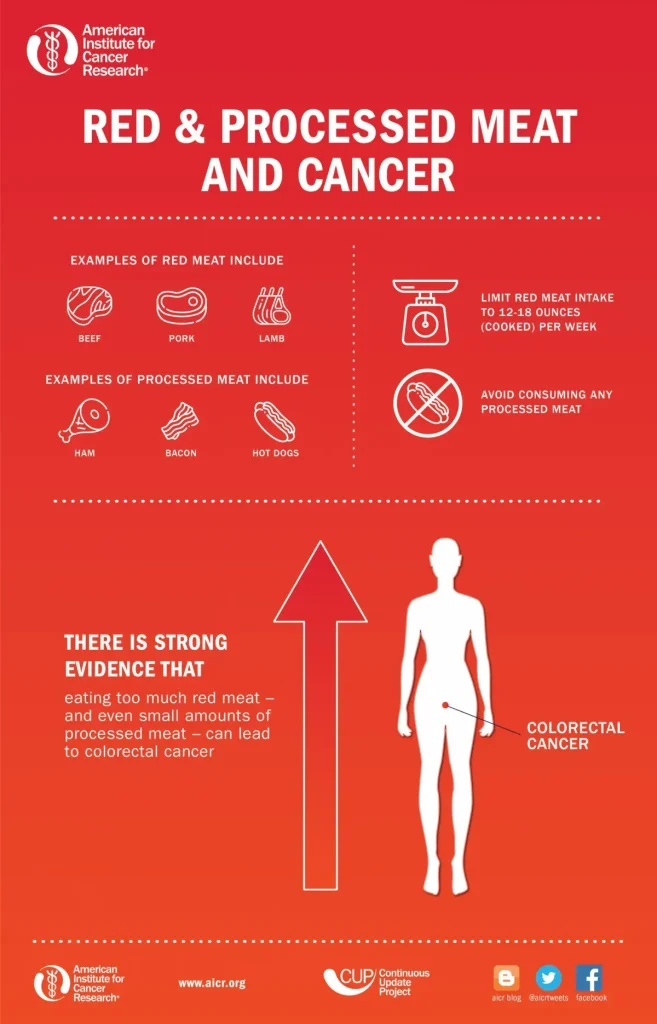Recent discussions around chicken cancer risk have sparked a flurry of interest in the relationship between poultry consumption and cancer. A new study suggests that eating significant amounts of chicken may be tied to an increased risk of certain cancers, raising concerns about chicken health risks in our diets. This research indicates that individuals who consume more than a typical portion of chicken weekly might face heightened risks, including early mortality. However, it is essential to consider that this study, like others in the field of poultry and cancer, has its limitations and does not establish a definitive cause-and-effect relationship. Nutrition experts advocate for a balanced perspective, reminding us that diet and cancer are multifaceted, and cooking methods can play a significant role in health outcomes.
When exploring the complex connections between dietary choices and health, the topic of chicken-related cancer risks emerges under various terminologies, such as poultry consumption and its implications for long-term wellness. Researchers have examined the impacts of these protein sources through comprehensive cancer studies involving diverse population groups over extended periods. These insights shed light on possible correlations between meat intake patterns and severe health outcomes, prompting questions about dietary habits and cancer prevention strategies. It’s crucial to recognize that findings related to diet, cancer, and cooking techniques underscore the necessity for thorough investigation and understanding. In navigating these health discussions, embracing a holistic view of nutrition can lead to more informed decisions regarding food choices.
Understanding the Recent Claims about Chicken and Cancer
Recent headlines have made a bold claim: eating chicken could potentially increase your cancer risk. This assertion is rooted in a study published by Italian researchers, who examined the dietary habits of nearly 5,000 adults over a span of 19 years. The results suggested that those consuming over 300 grams of chicken weekly had a notably higher chance of developing gastrointestinal cancers compared to those who limited their poultry intake. This has sparked controversy and concern, particularly amongst health-conscious eaters, as chicken has long been considered a healthy protein option.
However, it’s essential to approach these findings with caution. Experts have highlighted that the study’s observational nature does not prove direct causation; thus, while a correlation was found, it doesn’t definitively link chicken consumption to cancer. Factors such as overall diet, lifestyle choices, and genetic predispositions must also be taken into account. Many professionals in the nutrition and medical fields urge the public not to abandon chicken entirely based on these preliminary findings, emphasizing the need for further research and context.
The Flaws in the Research on Chicken and Mortality Risk
Critics have pointed out several significant flaws in the recent study linking poultry to cancer. For instance, the study does not fully account for confounding variables that could skew results. Participants’ baseline health conditions, dietary diversity, and other habits that may contribute to cancer risk were not comprehensively analyzed. This makes it challenging to draw meaningful conclusions solely from the relationship found between chicken intake and mortality risk, prompting experts to call for more robust investigation before unwarranted dietary panic takes hold.
Furthermore, experts stress the importance of replicating studies in order to validate results. The current findings are based on a single observational study, which is not sufficient to alter public health recommendations significantly. Many dietary and nutritional experts argue that chicken can be part of a healthy diet when consumed in moderation and prepared properly. Recommendations continue to suggest that poultry consumption can be included in a balanced diet without fear of adverse effects, especially when combined with other nutritious food choices.
Cooking Methods: Are They the Real Culprits Behind Cancer Risk?
The manner in which chicken is prepared could significantly affect its health implications. Cooking methods like grilling, frying, and charring can create harmful compounds known as heterocyclic amines (HCAs) and polycyclic aromatic hydrocarbons (PAHs), which have been associated with increased cancer risks. These chemicals form when meat is cooked at high temperatures, especially when it develops a charred or browned exterior. These cooking methods might contribute more to the potential risk of cancer than the chicken itself, thus highlighting the importance of paying attention to how we prepare our food.
As a result, nutritionists and health advisors recommend adopting safer cooking techniques. Methods such as baking, steaming, or poaching can significantly reduce the formation of these harmful compounds. Additionally, incorporating vegetables and whole grains into meals not only complements chicken dishes but also enhances diet diversity, providing protective nutrients that may lower overall cancer risks. In summary, it’s advisable to be mindful of cooking practices while enjoying chicken as part of a balanced and varied diet.
In conclusion, while concerns regarding “chicken cancer risk” have risen due to recent studies, the broader picture of poultry consumption and cancer is nuanced and complex.
The importance of aligning chicken consumption with other healthful dietary practices cannot be overstated, ensuring a holistic approach to nutrition.
Nutrition Experts Weigh In: Chicken in a Balanced Diet
Nutrition experts continue to advocate for the inclusion of chicken in a balanced diet. The U.S. Dietary Guidelines suggest a moderate consumption of poultry—generally one to three times per week—as part of a healthy eating pattern. This recommendation is rooted in the recognition of chicken as a high-quality protein source, rich in essential nutrients that the body needs. Despite the alarm raised by some recent studies, many dietitians reinforce that rabbit and poultry remain viable components of a nutritious diet when consumed in moderation, underscoring the importance of overall dietary patterns.
Moreover, the focus on balance and variety is critical. No single food, including chicken, is likely to determine an individual’s health outcomes. A diet rich in fruits, vegetables, whole grains, and healthy fats, along with proper cooking methods for poultry, is key to maintaining optimal health. Experts encourage consumers to approach their diets thoughtfully rather than reacting to isolated studies, promoting the idea that the foundation of good health is based on a diverse and well-rounded nutritional strategy.
Dietary Patterns and Their Effect on Chicken Consumption
Research suggests that dietary patterns play a more significant role in health outcomes than individual food items. While the focus of the recent study was primarily on poultry consumption and cancer risks, it is crucial to consider the broader context of what individuals eat regularly. Many people who regularly consume larger amounts of chicken may also have other dietary habits that influence their overall health, such as lower intake of fiber or higher consumption of processed foods, which could skew results related to cancer risk.
Consequently, addressing dietary habits holistically rather than singling out one food can provide a clearer picture of health implications. By balancing chicken consumption with plenty of fruits, vegetables, and whole grains, individuals can help mitigate health risks. Nutritionists advocate for evaluating one’s entire diet to maintain healthy eating habits, reinforcing the idea that moderation and variety are vital for overall well-being.
The Role of Fiber and Other Nutrients in Cancer Risk Reduction
A notable aspect often overlooked in the discussion of poultry consumption and cancer risk is the role of fiber and nutrient-rich foods in a balanced diet. High-fiber foods, such as fruits, vegetables, and whole grains, play a vital role in reducing cancer risk by promoting digestive health and contributing to a lower overall caloric intake. Those who consume an adequate amount of fiber may significantly counteract any potential negative effects associated with higher poultry intake.
Additionally, including a variety of nutrients helps create a synergy that supports overall health. Antioxidants, vitamins, and minerals found in whole foods can bolster the body’s defenses against cancer. Therefore, regularly incorporating chicken into a diet rich in fiber and other essential nutrients can help mitigate health risks. In essence, rather than fixating on the isolated aspects of chicken and cancer, fostering a comprehensive nutritional approach is essential for maintaining good health.
Navigating Nutrition Myths: The Truth About Chicken
In a world inundated with dietary myths, understanding the truth about food sources like chicken is crucial. Misinterpretations of research studies can spur unwarranted fears about health risks related to everyday foods. In this case, the recent study linking chicken consumption to increased cancer risks has prompted extensive debate, but as experts have indicated, the study’s observational nature does not mean it establishes hard and fast rules about chicken consumption.
It’s imperative to sift through the noise of misinformation and rely on consensus from the health and nutrition community. Chickens remain a valuable source of protein without being demonized as a significant contributor to cancer risk. Hence, consumers should feel empowered to include chicken in their diets while understanding the importance of balanced nutrition and informed cooking methods.
Adapting Chicken Consumption: Experts Offer Guidance
Despite the recent controversies surrounding poultry consumption, health experts suggest that adapting how chicken is consumed can mitigate any potential risks. Cooking chicken through methods that minimize harmful compound formation—such as baking, boiling, or slow-cooking—can greatly influence its health implications. Additionally, complementing chicken meals with a variety of vegetables ensures a fiber-rich diet that fosters better overall health.
Furthermore, nutritionists emphasize that the goal should be to foster an overall healthy lifestyle rather than focus singularly on one food item. Engaging in physical activity and maintaining a varied diet incorporating all food groups can help balance the health impacts of meat consumption. This multifaceted approach encourages individuals to enjoy the benefits of chicken without compromising their health, reassuring that poultry can remain a part of diverse and nutritious meals.
Frequently Asked Questions
What is the connection between chicken and cancer risk?
Recent research has suggested that consuming large amounts of poultry may be linked to an increased risk of cancer, especially gastrointestinal cancers. However, while the study indicated a correlation, it does not prove that eating chicken causes cancer. Other factors, such as overall diet and lifestyle, could also influence these findings.
How does the cooking method of chicken relate to cancer risk?
Cooking methods can impact cancer risk. High-temperature cooking methods like grilling and frying may create harmful compounds called heterocyclic amines (HCAs) and polycyclic aromatic hydrocarbons (PAHs), which can damage DNA and potentially increase cancer risk. It’s essential to consider how chicken is prepared when assessing health risks.
Are there specific dietary recommendations regarding poultry consumption and cancer?
Experts recommend consuming poultry in moderation, typically one to three times a week as per the U.S. Dietary Guidelines. Maintaining a balanced diet that includes a variety of foods is crucial for overall health and can mitigate specific cancer risks associated with any single food.
What did the major study on chicken and cancer reveal?
The study analyzed data from nearly 5,000 adults over 19 years and found that those who consumed more than 10.5 ounces of poultry weekly had a significantly increased risk of dying from cancers. However, it is critical to note that this was an observational study and does not establish causation.
Should I stop eating chicken based on the cancer study findings?
There is no need to panic or eliminate chicken from your diet based solely on this study. Health experts advise focusing on overall dietary patterns rather than the impact of individual foods. Variety and moderation are key to a healthy diet.
What factors should be considered alongside chicken consumption when evaluating cancer risk?
When evaluating cancer risk, it’s important to consider an individual’s overall diet, lifestyle choices such as physical activity, smoking habits, and socioeconomic factors. These elements can all play a significant role in health outcomes and cancer risk.
How can I reduce cancer risk while still eating chicken?
To minimize cancer risk when consuming chicken, focus on safe cooking methods: avoid charring or excessive browning, and ensure chicken is cooked to a safe internal temperature. Incorporating plenty of vegetables, whole grains, and healthy fats into your diet can also provide protective benefits.
| Key Point | Details |
|---|---|
| Study Findings | A study found that people consuming over 300 grams of chicken weekly had increased risks of cancer and mortality. |
| Study Limitations | The study is observational and does not prove causation, meaning other factors may influence cancer risk. |
| Cooking Methods | High-temperature cooking methods can create harmful compounds linked to cancer. |
| Expert Opinions | Experts recommend maintaining a balanced diet and not panicking based on a single study. |
Summary
Chicken cancer risk has recently come into the spotlight due to a study linking increased consumption of chicken to higher cancer rates. However, experts emphasize that the study’s observational nature does not establish causation. Instead, dietary habits, cooking methods, and overall health are crucial factors. Maintaining a balanced diet with moderated chicken consumption is advised.



